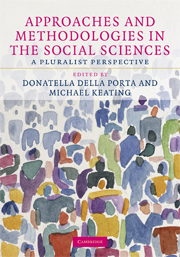Book contents
- Frontmatter
- Contents
- List of figures
- List of tables
- Contributors
- Preface
- 1 Introduction
- Part I Epistemology and philosophy of the social sciences
- Part II Research design
- 10 Concepts and concept formation
- 11 Comparative analysis: case-oriented versus variable-oriented research
- 12 Case studies and process tracing: theories and practices
- 13 Quantitative analysis
- 14 The design of social and political research
- 15 Ethnographic approaches
- 16 Comparing approaches, methodologies and methods. Some concluding remarks
- References
- Glossary
- Index
14 - The design of social and political research
Published online by Cambridge University Press: 05 June 2012
- Frontmatter
- Contents
- List of figures
- List of tables
- Contributors
- Preface
- 1 Introduction
- Part I Epistemology and philosophy of the social sciences
- Part II Research design
- 10 Concepts and concept formation
- 11 Comparative analysis: case-oriented versus variable-oriented research
- 12 Case studies and process tracing: theories and practices
- 13 Quantitative analysis
- 14 The design of social and political research
- 15 Ethnographic approaches
- 16 Comparing approaches, methodologies and methods. Some concluding remarks
- References
- Glossary
- Index
Summary
Let us assume that you have an idea that has led you to identify a topic that you believe to be of sufficient importance and of feasible execution to conduct research on it. It may be a doctoral dissertation, or just a seminar exercise, but regardless of length and complexity no topic can ‘research itself’. You will have to translate it – via a series of strategic choices – into a project. It is this process of translation from something problematic or puzzling into something on which you can gather valid data and about which you can make compelling inferences that constitutes your research design.
Granted, much social scientific research is not self-consciously designed – it is not subject to a deliberate and critical process of choosing its components and defending its overall configuration. In many areas of inquiry, the design is literally given along with the topic. So much research has already been conducted on it that adding yet another case or extending it to yet another time period does not seem to require a novel effort of translation. Indeed, the universal desire of all sciences to produce cumulative knowledge seems to militate against continuously challenging and changing the standard way of doing research. If you do propose a change in design – say, a reconceptualization of the topic, a revised instrument for measuring variation, a different way of selecting relevant cases, or a novel method of testing for association – you will risk confusing your reader-cum-critic.
- Type
- Chapter
- Information
- Approaches and Methodologies in the Social SciencesA Pluralist Perspective, pp. 263 - 295Publisher: Cambridge University PressPrint publication year: 2008
- 10
- Cited by



